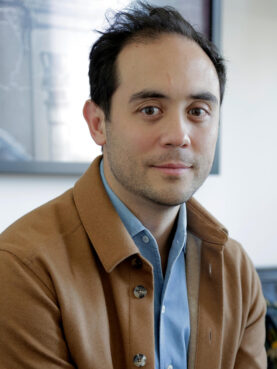(RNS) — In the summer of 2022, a dozen pastors from different backgrounds and traditions gathered in Grand Rapids, Michigan, to answer one simple question.
Won’t you be my neighbor?
The question was inspired by the teachings of Jesus and one of his most well-known modern followers — Fred Rogers, who greeted millions of children for decades with that simple but profound question. Over the next year, the group of pastors — conservative and progressive, men and women, gay and straight, Black, white and Asian American — gathered to see if they could disagree and still stay together.
Would friendship and shared faith prove stronger than polarization? The answer, at least at the beginning, was: “I don’t know.”
“If I don’t know the answer, that makes an interesting story,” said Nicholas Ma, a filmmaker who followed the pastors on their journey.
The result was “Leap of Faith,” a new documentary that debuts Friday (Oct. 4) in Grand Rapids, Nashville, Phoenix, and a handful of other cities before expanding to wider release later in the month. The film was inspired in large part by a 2018 documentary about Rogers, which Ma produced. During screenings of that earlier film, Ma — who appeared on “Mister Rogers’ Neighborhood,” the long-running children’s program, with his father, the famed cellist Yo-Yo Ma — recalled that people would often ask, “Where are the Fred Rogers of today?”

Pastors in the “Leap Of Faith” documentary answer questions in a line exercise by going to different areas based on their answers. (Photo © Picturehouse 2024)
“It felt like a question that needed to be answered,” said Ma, especially in the days after the 2020 election, when it seemed like the county was coming apart at the seams.
Around that time, Ma came across an article in The Wall Street Journal about a church in Michigan trying to bridge some of the culture’s divides. Helping them was the Rev. Michael Gulker, leader of the Colossian Forum, a Grand Rapids-based nonprofit specializing in conflict resolution.
Ma called Gulker and the two started talking about collaborating. One option was gathering leaders from different parts of the country. But Gulker felt that might lead to good feelings but no lasting change.
“When you are not sharing a backyard, this kind of work becomes abstract — and ends up like a group hug,” he said. “When you’re dealing with the same people in the same city with the same local politics, it has a different kind of feel.”
The film follows the pastors through a series of retreats — as they first get to know each other and talk about their hopes and aspirations, and then as they deal with the reality that friendship won’t erase their differences.

“Leap of Faith” film poster. (Image © Picturehouse)
At one point, the pastors gather in the center of a room and answer a series of questions. Those who answer “Yes” go to one side, while the “No’s” go to the other. The questions start out lighthearted. For example, the Rev. Molly Bosscher, an Episcopal priest, is the only person to have memorized the names of the books of the Bible in order.
Then the questions get more serious. When asked if they would officiate a same-sex marriage, the group is split in half.
The discussions that follow reveal the pain that theological divides cause. The Rev. Joan VanDessel, a married lesbian United Methodist minister, says she hoped the growing friendships would change her fellow pastors’ minds about the topic. When that did not happen, there was a sense of betrayal and pain.
“The response to that was a lot more painful than I expected,” VanDessel tells the group. That leads to a discussion where the pastors see the human cost of the divide on that issue and how they don’t want that disagreement to tear them apart.
A key part of that discussion was vulnerability and accepting differences.
“Why can’t we be who we are and that be OK to the next person?” asks Chase Stancle, pastor of Unison Christian Church, at one point. “Why do we try to make everybody believe and feel the same way?”
Through the discussion, the pastors formed a sense of belonging that was stronger than their differences and wanted to build a Christian community that made room for all of them.
In recent weeks, the filmmakers held screenings of the movie in Boston, St. Louis and Grand Rapids. They included performances by Yo-Yo Ma, who had been following the story of the filmmaking through conversations with his son.
“What is in common between music and religion is the idea of faith and trust, because faith is a form of trust,” the famed cellist said in an interview. “I know I can’t perform with somebody on stage without totally trusting them.”
That trust, like making friendships or building a community, is a leap of faith — and comes as people decide to be vulnerable with one another.
“When trust is there, it’s because we allow ourselves to be vulnerable, and that becomes a strength because then you can build bridges,” said Yo-Yo Ma. “Otherwise, it’s like you’re two independent actors and you’re making transactions, whereas if you’re really trusting, then it’s a process of uniting and making one out of many.”
Gulker said the pastors in the group were ready for something better than the current political and social climate, where distrust and anger are commonplace. That allowed them to take a leap of faith.
“They were ready for friendship, especially after the grueling time of the pandemic and all political polarization,” he said. Gulker said he hopes the folks who see the film will follow in the pastors’ footsteps.
The Rev. Kelly Fassett, executive director of UniteBoston, which seeks to foster relationships between churches, saw a screening of the film in Boston last week. She said the film has given her a lot to think about as she tries to create spaces of “reconciliation, kinship and belonging for all of God’s children.”
“Truly, the theological positions we hold must also result in a deeper love of God and deeper love of neighbor — an important message for our world today, especially in this election year,” she said.

Nicholas Ma. (Photo © Picturehouse 2024)
Steve Watson, pastor of Reservoir Church, a post-evangelical church in Cambridge, Massachusetts, said the film left him wondering what kinds of friendships he might be able to make with his neighbors. He had hoped more might happen in the film, that perhaps friendship might lead folks to change their minds on issues, but that did not happen.
“On the other hand, a different kind of small miracle occurs. They do genuinely manage to become friends,” he said. “The subtext feels like if we’re expecting that love of neighbor will persuade our political or theological opponents to believe or vote like us, that likely isn’t going to happen, or at least not usually and not quickly.”
Nicholas Ma said the pastors taught him about the power of doing simple things like eating together, listening and sticking together even when things get hard.
“There is something on the other side of hanging in there that is beautiful,” he said. “You don’t know when it’s going to happen, or how it’s going to happen, or if it’s going to happen, but you’ve got to hang in there because it is so nourishing and beautiful.
“That is the world we want to live in,” he said.




